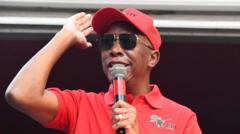Why Was South Africa's Firebrand Politician Banned from the UK?

Understanding the Controversy Surrounding Julius Malema's Denial of Entry to the UK
The recent denial of entry to the UK for Julius Malema, a prominent South African politician, has sparked heated discussions around race relations, freedom of speech, and national security. This article delves into the complexities of Malema’s political stance, the implications of the UK government’s decision, and the broader context of political discourse in South Africa and beyond.
The Background of Julius Malema
Julius Malema is the leader of the Economic Freedom Fighters (EFF), a political party known for its radical stance on economic issues and strong rhetoric surrounding race relations in South Africa. Malema has been a controversial figure since his rise to prominence within the African National Congress (ANC) youth league, where he gained a reputation for his outspoken views on land reform and wealth redistribution.
His political career has been marked by a series of provocative statements and actions aimed at addressing historical injustices in South Africa, particularly those that pertain to the legacy of apartheid. This has placed him at the center of debates regarding race, economic disparity, and the future of democracy in South Africa.
The UK Government's Decision
The UK Home Office's decision to deny Malema entry was based on the assessment that his presence would be "non-conducive to the public good." This statement raises significant questions about the criteria used to evaluate political figures and the implications for international relations.
Reasons Cited for Denial
Several key points were highlighted by the UK government in their letter:
- Support for Hamas: Malema's vocal support for Hamas, particularly following the October 7 attacks, was noted as a primary concern. His statement about arming the group if his party gained power has raised alarms about his political ideology and intentions.
- Incendiary Rhetoric: Malema's threats to incite violence, including calls for the "slaughter of white people," were singled out as reasons for the denial. Such statements are viewed as inflammatory and potentially dangerous in the context of global security.
- Previous Denial: This is not the first time Malema has been denied entry to the UK. The earlier refusal was attributed to a late application, but the latest decision is described as a substantive one, suggesting a deeper concern about his influence and message.
Impact on South African Politics
The denial of entry has elicited strong reactions from Malema's supporters and the EFF. The party has condemned the UK's decision as "cowardice," arguing that it undermines democratic debate and the right to free speech. This incident raises broader questions about the intersection of politics and international relations, particularly in a post-apartheid South Africa where issues of race and inequality remain deeply contentious.
The EFF's Response
The EFF has characterized the UK government's actions as an attempt to silence dissenting voices and stifle political discourse. For many in South Africa, Malema’s rhetoric resonates with the frustrations of marginalized communities who feel that they have been left behind in the nation’s economic recovery.
While the EFF continues to gain traction in South African politics, their radical approach has also drawn criticism from various sectors, including those who argue that Malema’s rhetoric could exacerbate divisions within the country.
The Broader Context of Race Relations in South Africa
The controversy surrounding Malema's denial of entry cannot be viewed in isolation from the historical and contemporary issues facing South Africa. The country is still grappling with the legacies of apartheid, which have left deep scars on its social fabric.
Historical Context
South Africa's history of racial segregation has resulted in significant economic disparities along racial lines. The post-apartheid government has made strides in addressing these injustices, but many believe that the pace of change has been insufficient. Malema’s calls for radical economic transformation resonate with those who feel disenfranchised and seek immediate action to rectify past wrongs.
The Role of Political Rhetoric
Political rhetoric in South Africa has often been incendiary, reflecting the passionate divides that exist within society. Malema's statements, while controversial, are symptomatic of a larger struggle for power and representation among marginalized groups. His supporters see him as a voice for the voiceless, while detractors view him as a dangerous demagogue.
International Repercussions and Free Speech Concerns
The UK’s decision to deny Malema entry raises important questions about the limits of free speech, especially for political figures. It also highlights the role of international perceptions in shaping domestic politics. The intersection of national security and political expression is a delicate balance that governments must navigate.
Implications for South Africa's Global Standing
As South Africa continues to develop its global identity, the treatment of its political figures abroad can have significant implications. Malema’s denial of entry could be perceived as a slight against South Africa's sovereignty and an attempt to influence its political landscape from outside.
The Debate on Political Expression
Free speech is a cornerstone of democratic society, yet it is often tested in the realm of politics. The question remains: at what point does political expression cross the line into hate speech or incitement to violence? The UK’s stance may reflect a growing trend among nations to scrutinize the rhetoric of foreign political figures, especially those with a history of incendiary language.
Conclusion: A Call for Reflection
The denial of Julius Malema's entry to the UK opens up a myriad of questions surrounding race relations, political expression, and international diplomacy. As South Africa navigates its complex history and present realities, the actions and words of its leaders will continue to be scrutinized both domestically and internationally.
This incident serves as a reminder that political discourse is not merely a matter of words; it carries weight and consequences that can shape nations and affect international relations. As stakeholders in a global society, it is crucial for citizens, leaders, and governments to engage in thoughtful dialogue that considers the diverse perspectives at play.
In a world where political tensions often run high, how do we ensure that dialogue remains constructive and geared towards understanding rather than division? As we ponder these questions, let us consider the role of empathy and communication in bridging the gaps that exist within our societies.
FAQs
What is Julius Malema known for?
Julius Malema is known for his leadership of the Economic Freedom Fighters (EFF), advocating for radical economic transformation in South Africa and addressing issues related to race and inequality.
Why was Malema denied entry to the UK?
Malema was denied entry due to concerns regarding his support for Hamas and inflammatory rhetoric that the UK government deemed "non-conducive to the public good."
What does this incident mean for free speech in politics?
This incident raises questions about the limits of free speech, especially regarding political figures whose rhetoric may incite violence or division. It highlights the delicate balance between protecting free expression and ensuring public safety.
As we reflect on the implications of this decision, what do you think is the most effective way to foster constructive political dialogue in our increasingly polarized world? #JuliusMalema #RaceRelations #PoliticalDiscourse
Published: 2025-06-19 07:39:04 | Category: world



